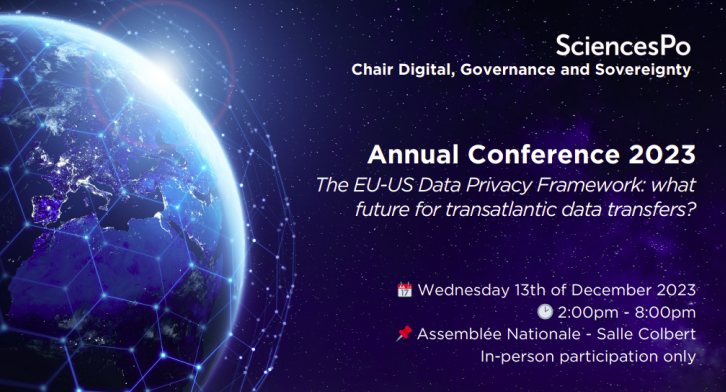
[INTERVIEW] The provisions governing Foundation Models in the upcoming AI Act: questions to Rishi Bommasani
1 December 2023
[CALL FOR PAPERS] Internet fragmentation: assessing risks, acknowledging realities and charting the future
15 December 2023Annual Conference 2023
The EU-US Data Privacy Framework: what future for transatlantic data transfers?
December 13th
2 pm- 7.00 pm
Assemblée Nationale (French Parliament)
Salle Colbert
Entrance via 128 Rue de l’Université 75007 Paris / Panel “Accueil du public”
In partnership with Cercle Montesquieu

The event will be held in English and French, with simultaneous translation available in the form of subtitles.
In-person participation only
The conference takes place at the National Assembly. For security reasons (plan Vigipirate) we ask you to provide information in the form available here BEFORE THURSDAY DECEMBER 7TH 7PM that will remain confidential and will not be kept by Sciences Po: first name, surname, date and place of birth.
The EU-US Data Privacy Framework: what future for transatlantic data transfers?
On July 10, 2023, the European Commission definitively adopted the adequacy decision on the Data Privacy Framework (DPF). The Commission found that the safeguards provided by the new US Executive Order 14086 and the following EU-US agreement on the Data Privacy Framework offer an adequate level of protection for personal data transferred from the European Union to the US. It was about time the new framework came into force. Since the invalidation of the Privacy Shield on July 16, 2020, transatlantic data transfers have been mostly based on standard contractual clauses, posing increasingly insurmountable difficulties. Despite the achievement of this milestone, multiple questions and uncertainties remain open circa the legal and technical implementation of the agreement and a third potential invalidation coming from the EU Court of Justice.
This year’s conference will focus on the new transatlantic data-flow agreement, the legal and technical challenges of its implementation and the global perspectives of current trends in data transfers and data localization.
PROGRAM
2:00 pm Door opening
2:30 pm Welcome address by Emmanuel Lacresse, Member of Parliament, Député de Meurthe et Moselle (2e circonscription)
2:40 – 4:15 pm PANEL 1 – The new EU-US Data Privacy Framework
Moderator : Laure Lavorel, Senior Associate General Counsel at Broadcom for International Software franchise covering EMEA & APJ, Honorary President of Cercle Montesquieu
• Florence G’sell, Chairholder, Professor of Law at the University of Lorraine, Lecturer at the Sciences Po School of Public Affairs, visiting professor at the Stanford Cyber Policy Center
• Christiane Féral-Schuhl, Attorney-at-law, Member of the Paris and Quebec Bars, Vice-President of the French National Mediation Council, Former President of the French National Bar Council, Former President of the Paris Bar Association
• Marc Rotenberg, President and Founder of the Center for AI and Digital Policy, Washington
• Bruno Gencarelli, Director of the “International Data Flows and Protection” Unit at the European Commission
4:15-4:30 p.m. Break
4:30 p.m.-5:45 p.m. PANEL 2 – The concrete impact of the Data Privacy Framework on transatlantic data transfers
Moderator: Martin Pailhes, Member of Cercle Montesquieu and Global Manager Legal Digital & IP of BNP Paribas
• Ilias Chantzos, Global Privacy Officer and Director EMEA Government Affair at Broadcom
• Anne Debet Professor of private law at Université Paris Descartes, member of the CNIL
• André Loesekrug-Piétri, President of the Joint European Disruptive Initiative
• Amandine Reix, Sous-directrice du Spatial, de l’Electronique et du Logiciel, Service de l’Economie Numérique, Ministère de l’Economie, des Finances et de la Souveraineté Industrielle et Numérique
• Jean-Baptiste Soufron, Lawyer at the Paris Bar, cabinet FWPA, member of the Association for the Defense of Constitutional Liberties (ADELICO)
5:45 – 6:00 pm Break
6:00 – 6:45 pm Keynote by Professor Anupam Chander, Scott K. Ginsburg Professor of Law and Technology at Georgetown University Law Center (Washington DC)
6:45 pm Conference close-up
To register, click below
Please note: Registration is required before December 7th to attend the event, which will be held in person.
Please arrive 10 minutes before the beginning of the conference. An ID will be required upon entry.
Discover more about our past annual conferences:
Annual Conference 2022: Digital Sovereignty and Geopolitical Conflicts
Annual Conference 2021: Sovereign Cloud
Annual Conference 2020: The EU and the new governance of digital markets
Annual Conference 2019: Digital Sovereignty
Annual Conference 2018: Data and Democracy
©NicoElNino
SPEAKERS

Anupam Chander is the Scott K Ginsburg Professor of Law at Georgetown University Law Center.The author of The Electronic Silk Road (Yale University Press), he is an expert on the global regulation of new technologies. His scholarship has appeared in the Yale Law Journal, the California Law Review, and the American Journal of International Law, among other legal publications, and his research has been featured in news stories by Business Insider, CNN, NPR, and Forbes.
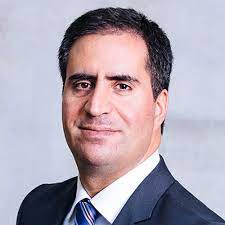
Ilias Chantzos is the Global Privacy Officer and the Head of Government Affairs programs for Europe, Middle East & Africa (EMEA) of Broadcom. He leads the global privacy program across the company’s multiple business units and regions.

Anne Debet is a professor of private law at Paris Descartes University, a member of the Institut Droit et Santé, and a member of the CNIL. She teaches various aspects of personal data protection and, within the Faculty of Law, runs a diploma designed to train data protection officers (DPO). She has written numerous legal articles in this field and has published a collective treatise on data protection issues. A specialist in digital law and fundamental rights, she has taken part in discussions on incorporating the RGPD into domestic law and, in recent years, on Open Data.

Christiane Féral-Schuhl is a lawyer (founding partner cabinet Feral) with a specialization in new technologies and intellectual property law. She was President of the Conseil national des barreaux (French national bar council) for the term of office and President of the Paris Bar.

Bruno Gencarelli is Deputy to the Director for Fundamentals Rights and Rule of Law, and heads the International Data Flows and Protection unit at the European Commission. He was in charge of the Commission’s work in the area of data protection in the decisive phases of the legislative reform of EU data protection law. He also led the negotiations of several data transfer arrangements, including the EU-Japan mutual adequacy arrangement creating the world’s largest area of free and safe data flows. He recently co-led for the EU the negotiations with the UK on all aspects relating to justice and consumers in the context of Brexit.

Florence G’sell is a professor of private law at the University of Lorraine and leads the Digital, Governance and Sovereignty Chair at Sciences Po. She began her academic career working mainly on tort law, judicial systems and comparative law. For the past several years, she has been working on digital law and in particular on issues related to the regulation of on line platforms, the way law can deal with new technologies (Blockchain, Metaverse), the notion of digital sovereignty and, more generally, digital policies in the EU and the US. She is visiting professor at the Stanford Cyber Policy Center.

Laure Lavorel serves as Senior Associate General Counsel at Broadcom for International Software franchise covering EMEA & APJ. She is the honorary president of Cercle Montesquieu, an association of French corporate lawyers.
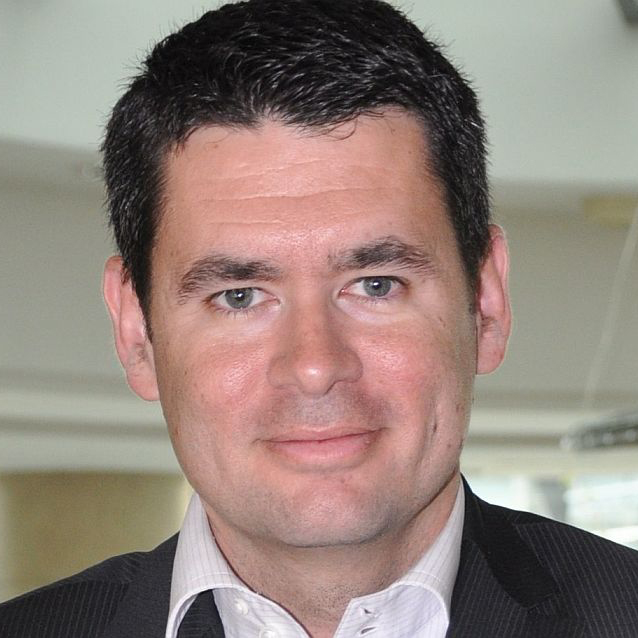
André Loesekrug-Pietri is the president of the Joint European Disruptive Initiative (JEDI), aiming to accelerate France and Germany’s leadership in disruptive innovations. He served as Special Advisor to the French Minister of Defence, responsible in particular for European Defense policy as well as technology and innovation.

Martin Pailhes is a corporate lawyer, a member of the Cercle Montesquieu, and head of the IT/IP practice in the BNP Paribas Group’s legal department. He teaches at the University of Paris II-Descartes as part of the Data Protection Officer degree programme.
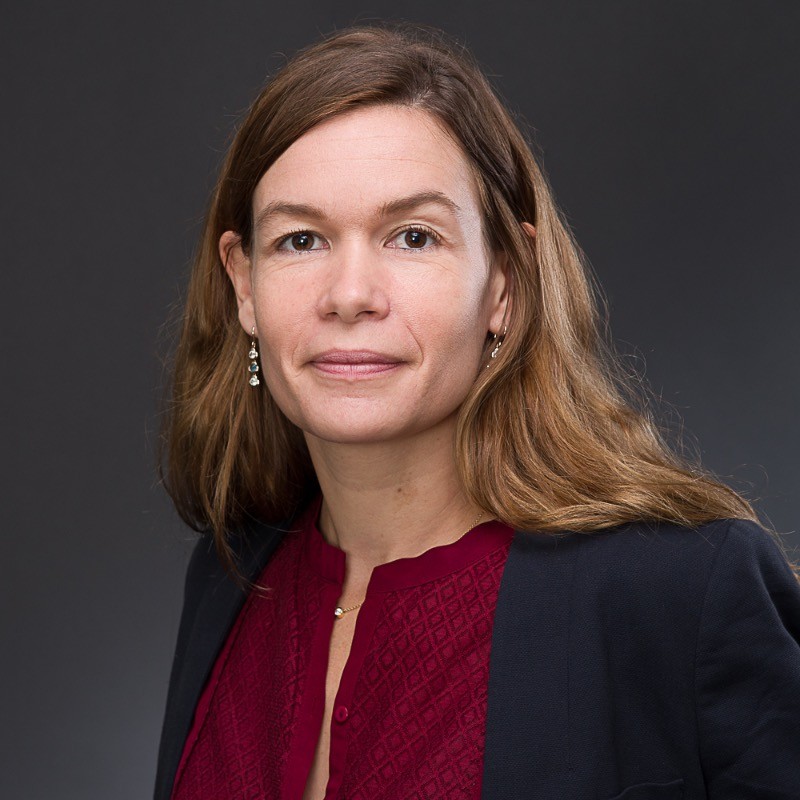
Amandine Reix is sous-directrice for Space, Electronics and Software in the Digital Economy Department at the French Ministry of the Economy, Finance and Industrial and Digital Sovereignty, having previously worked for the Délégation générale de l’armement.
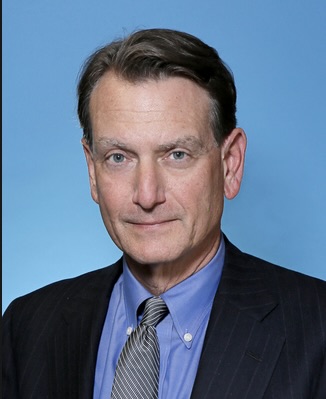
Marc Rotenberg is Executive Director and Founder of the Center for AI and Digital Policy. He is a leading expert in data protection, open government, and AI policy. He has served on many international advisory panels, including the OECD AI Group of Experts. Marc helped draft the Universal Guidelines for AI, a widely endorsed human rights framework for the regulation of Artificial Intelligence. Marc is the author of several textbooks including the 2020 AI Policy Sourcebook and Privacy and Society (West Academic 2016).
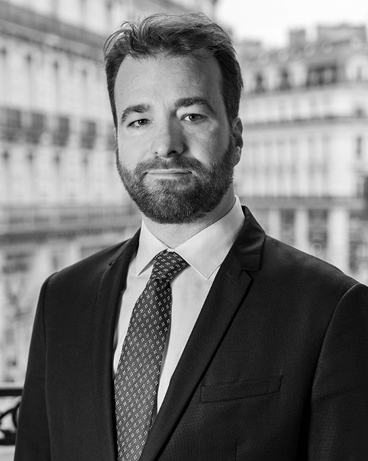
Jean-Baptiste Soufron is a lawyer at the Paris Bar. He was the first legal director of the Wikimedia Foundation. A former adviser on the digital economy to the Secretary of State for Digital Affairs and then General Secretary of CNN, the French National Digital Council, he is now a partner at FWPA Avocats and a lecturer at Sciences Po. He is a member of the Association for the Defence of Constitutional Freedoms (ADELICO).

![[INVITATION] ANNUAL CONFERENCE 2023: The EU-US Data Privacy Framework Slide](http://www.sciencespo.fr/public/chaire-numerique/wp-content/plugins/revslider/public/assets/assets/dummy.png)
